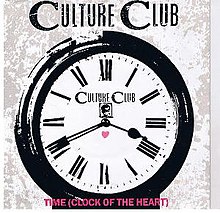Time (Clock of the Heart)
| "Time (Clock of the Heart)" | |||||||||
|---|---|---|---|---|---|---|---|---|---|
 |
|||||||||
| Single by Culture Club | |||||||||
| from the album Kissing to Be Clever | |||||||||
| B-side |
"White Boys Can't Control It" "Romance Beyond the Alphabet" (US Version) |
||||||||
| Released | 19 November 1982 | ||||||||
| Format | 7", 12" | ||||||||
| Recorded | 1982 | ||||||||
| Genre | New wave | ||||||||
| Length | 3:42 | ||||||||
| Label | Virgin | ||||||||
| Writer(s) | Roy Hay, Boy George, Mikey Craig, Jon Moss | ||||||||
| Producer(s) | Steve Levine | ||||||||
| Culture Club singles chronology | |||||||||
|
|||||||||
|
|||||||||
"White Boys Can't Control It"
"Time (Clock of the Heart)" is a song by the British new wave band Culture Club, released as a stand-alone single in most of the world and as the second single from their debut album Kissing to Be Clever in North America. Following on the heels of the band's global #1, "Do You Really Want to Hurt Me", "Time (Clock of the Heart)" peaked at number three on the UK Singles Chart, selling over 500,000 copies in the UK. In the United States, the song matched the #2 peak of its predecessor on the Billboard Hot 100, kept from #1 by "Flashdance... What a Feeling" by Irene Cara for 2 weeks.
In Europe and United Kingdom, it was a stand-alone single, released in November 1982. For this market, its first inclusion on a Culture Club album was on their 1987 compilation, called This Time: The First Four Years.
In a retrospective review of the song, Allmusic journalist Stewart Mason wrote: "Of all of Culture Club's early hits, Time (Clock of the Heart) has probably aged the best. Boy George drops the cryptic self-mythology long enough to deliver a tender, heartfelt lyric on lost love."
The music video has been released in two versions. The only difference was a scene where the group is watching TV, along with vocalist Helen Terry. In one version, a Christmas tree is shown. In the other, the tree is removed. This was because of the date of release for certain markets. The "Christmas" version (which is on the 2005 DVD "Greatest Hits"), was for European countries and the "regular version" was for the other markets, where the song was released in spring 1983.
The US single was released with the B-side being an instrumental version of the song called "Romance Beyond the Alphabet", which not only removed the vocals but at least one layer of melody as well.
...
Wikipedia
